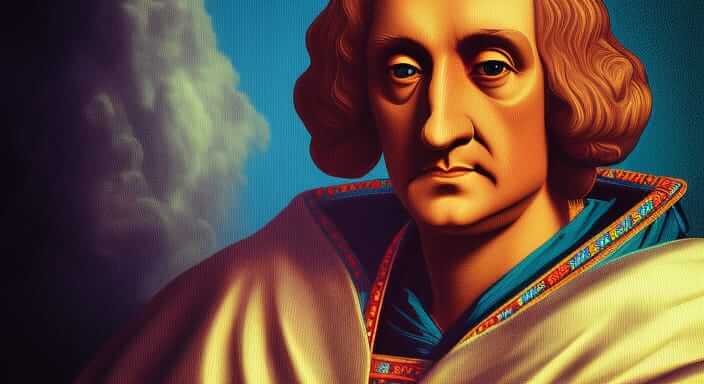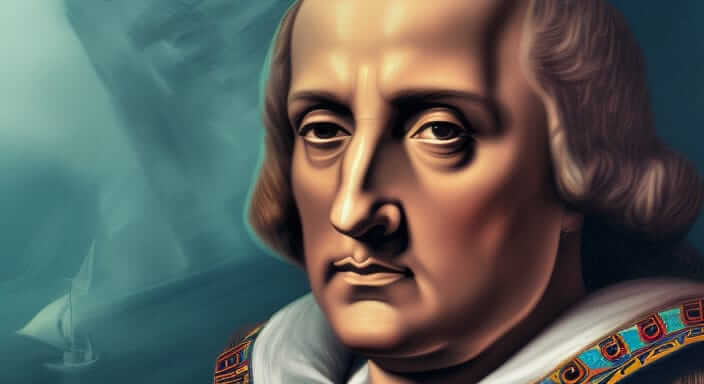Discover the fascinating life of Christopher Columbus, the Italian explorer who embarked on a historic journey to the Americas. Uncover the truth behind his voyages, their impact on indigenous peoples, and the lasting consequences on global history.

Christopher Columbus was an Italian explorer and navigator who is widely credited with discovering the Americas. In the late 15th century, he embarked on a series of voyages sponsored by the Catholic Monarchs of Spain, seeking a western route to Asia. On October 12, 1492, Columbus and his crew landed on an island in the present-day Bahamas, believing they had reached the Indies. This event marked the beginning of European exploration and colonization of the Americas, leading to significant historical and cultural impacts. Despite his significance in history, Columbus’s expeditions also resulted in the subjugation and exploitation of indigenous populations, making him a controversial figure.
Interesting facts about Christopher Columbus
- Christopher Columbus was not the first person to discover the Americas. Indigenous peoples had been living in the Americas for thousands of years before Columbus arrived.
- Columbus initially set sail on his famous voyage in 1492 with the goal of reaching Asia by sailing westward, but he miscalculated the Earth’s size, leading him to believe that he had reached Asia when he arrived in the Caribbean.
- Columbus made a total of four voyages to the Americas between 1492 and 1504, exploring various Caribbean islands, Central America, and South America.
- Despite popular belief, Columbus did not actually prove that the Earth was round. By Columbus’ time, most educated people already knew that the Earth was spherical.
- Columbus’s voyages had a significant impact on global history. They initiated widespread European exploration and colonization of the Americas, leading to the eventual establishment of European colonies and the transatlantic slave trade.
- Columbus’s encounters with indigenous peoples during his expeditions led to both cultural exchange and devastating consequences for native populations, including disease outbreaks and forced labor.
- The voyages of Columbus had lasting effects on the world, including the Columbian Exchange, which involved the exchange of plants, animals, and diseases between the Old World (Europe, Africa, and Asia) and the New World (the Americas).
- Columbus’s achievements were not fully recognized during his lifetime. He died in 1506 believing he had reached Asia, and it was only later that his voyages were seen as the beginning of a new era of exploration.
- Columbus’s legacy is a subject of debate and controversy. While he is celebrated in some countries as a heroic figure, his actions and their consequences have also been criticized for their negative impact on indigenous populations and their role in the colonization and exploitation of the Americas.
- Columbus’s voyages opened up new trade routes and opportunities for European powers, ultimately leading to the era of European dominance and the shaping of the modern world.
Biography
Christopher Columbus, born in 1451 in the Republic of Genoa (present-day Italy), was an Italian explorer and navigator. Little is known about his early life, but it is believed that he received a basic education and learned navigation skills from his father, who was a weaver and also worked as a sailor.
In the late 15th century, Columbus became convinced that he could reach Asia by sailing westward across the Atlantic Ocean. He sought support for his ambitious plan from various European monarchs but faced multiple rejections before finally gaining the support of the Catholic Monarchs of Spain, Queen Isabella I and King Ferdinand II.

On August 3, 1492, Columbus set sail from Spain with three ships—the Santa Maria, the Pinta, and the Niña—leading his expedition into the unknown. After more than two months at sea, on October 12, 1492, Columbus and his crew sighted land, believing they had reached the Indies. However, they had actually arrived in the Bahamas in the Caribbean.
Columbus made three more voyages to the Americas, exploring various islands in the Caribbean, the coasts of Central and South America, and even reaching present-day Venezuela. His expeditions opened up new trade routes and established the foundation for European colonization in the Americas.
Despite his achievements, Columbus’s legacy is marred by controversy and criticism. His encounters with indigenous peoples led to the exploitation, enslavement, and devastation of native populations. The impact of European colonization on the Americas was profound and had far-reaching consequences.
Christopher Columbus died on May 20, 1506, in Valladolid, Spain, without fully realizing the true extent of his discoveries. While he is historically recognized as a significant figure in exploration, his actions and their consequences have sparked debates and reevaluations of his place in history.